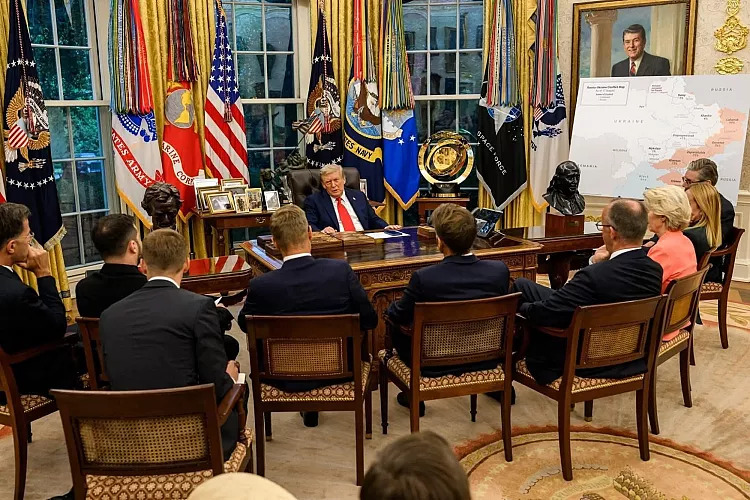The European Union’s ongoing pursuit of an economy-first strategy continues to encounter significant obstacles, especially the erosion of its economic autonomy resulting from the strategic concessions it has made to the United States.

A multilateral meeting to discuss peace in Ukraine in the White House, 18 August, 2025. (Photo: AP)
On July 27, the European Union and the United States reached a bilateral trade agreement that is at least a preliminary success for President Donald Trump, who has used tariffs as leverage against the EU.
In an effort to avoid a potentially devastating disruption of transatlantic trade, the EU ultimately chose the lesser of two evils — making broad concessions to Washington in areas such as special tariffs, market access, industrial investment and energy.
The agreement highlights the EU’s limited bargaining power in the face of coercive diplomacy by the United States, despite being the world’s third-largest economy and home to a vast, high-quality internal market.
In this regard, the EU appears little different from other close U.S. allies, including the United Kingdom, Japan and South Korea. The EU’s trade concessions, along with its alignment with the outcomes of this year’s NATO Summit in The Hague, are widely seen as significant setbacks to its long-standing ambition of achieving strategic autonomy.
The EU’s inability to effectively counter U.S. pressure stems primarily from its deep-rooted dependence on Washington across economic, military and strategic domains.
Economically, the U.S. has solidified its role as the EU’s largest trading partner and the primary source of its trade surplus. Last year the United States accounted for 20.6 percent of EU exports, with the trade surplus reaching 198.2 billion euros — surpassing the combined surplus with all other regions 150.1 billion euros). The EU’s top three export categories to the U.S. — pharmaceuticals, automobiles and industrial machinery — are among the few sectors in which it still maintains global competitiveness.
On strategic security, the European Union has shown limited ability to influence or de-escalate major conflicts, including those in Ukraine, between Israel and Palestine and between Israel and Iran. In the case of the Russia-Ukraine war, the EU has largely relied on the United States for security assurances, compromising on defense spending and arms procurement in order to keep the U.S. committed to supporting Ukraine and countering Russia.
The argument that economic and military consolidation is essential for Europe to regain its diplomatic and strategic agency is not new. Christian Kullmann, CEO of German chemical conglomerate Evonik, has articulated a version of this vision in his advocacy of an economy-first approach. He empasizes economic competitiveness and market expansion as the material and strategic foundations of geopolitical independence. This perspective reflects growing concerns within Europe’s business and industrial sectors regarding the bloc’s current strategy, which appears overly diffuse across economic and military domains without a clear prioritization of core capabilities. It also reflects a long-term European response to the uncertainties of U.S. foreign policy.
For a global actor such as the EU, the effective management of internal affairs is a prerequisite for engaging in great-power competition and securing long-term development. Strategic planning and implementation must take precedence over reactive responses to short-term crises. Whether it is Trump’s push for the reshoring of manufacturing, China’s steady pursuit of modernization or the UK’s new “securonomics” and state interventionism, the world’s major powers are increasingly focused — either in effect or outright assertion — on economic competition. Their goal is to harness development dividends to bolster societal resilience and public trust in national institutions.
The EU’s economy-first strategy prioritizes three core areas:
• Enhancing global competitiveness. In January, the European Commission introduced the Competitiveness Compass as a direct response to the challenges and recommendations outlined in former ECB President Mario Draghi’s report on the future of European competitiveness. The initiative includes support for emerging industries such as artificial intelligence, regulatory streamlining, the reduction of administrative burdens on businesses and a multi-pronged approach to lowering energy costs.
• Diversifying economic partnerships and expanding non-traditional markets. The EU has actively explored accession to the Comprehensive and Progressive Agreement for Trans-Pacific Partnership (CPTPP) and expedited negotiations on a free trade agreement with Mercosur. These initiatives aim to reduce the risks associated with overreliance on the U.S. market and associated supply chains.
• Boosting investment in the real economy. The 500-billion-euro infrastructure investment plan proposed by the German government under Chancellor Friedrich Merz is widely regarded as the EU’s most significant response so far to calls for greater investment. Nevertheless, the implementation of the economy-first strategy faces serious challenges.
First, the EU and its member states continue to prioritize geopolitical confrontation — especially opposition to Russia — over economic revitalization. From reducing dependence on Russian energy through increased U.S. imports, to expanding sanctions and even crossing military thresholds with the delivery of Taurus missiles to Ukraine, the EU appears committed to a trajectory of sacrificing its economy to counter Russia.
This approach impedes the reallocation of political priorities and financial resources toward economic development. Prolonging a war of attrition over geopolitical disputes will further entrench the EU’s reliance on U.S. security guarantees.
Second, strategic concessions made to the United States have further undermined the EU’s economic autonomy. Whether or not the ambitious targets of 750 billion euros in energy imports and 600 billion euros in U.S.-bound investments are fully realized, the EU is becoming increasingly enmeshed in the American economic system. This deepening entanglement compromises the EU’s ability to exercise independent economic policymaking and diverts resources from efforts to achieve genuine self-reliance. It may also intensify internal divisions between factions advocating a more assertive stance against American influence and those favoring continued compromise.
Looking ahead, European political elites may increasingly recognize that the United States is an unreliable partner and that Europe must chart a more autonomous path. However, reversing the current pattern, which is characterized by U.S. coercion and unilateral extraction, will prove progressively more difficult.